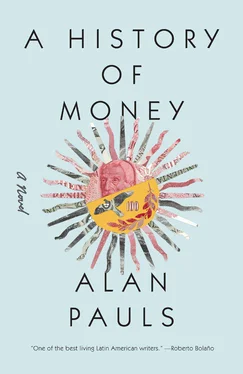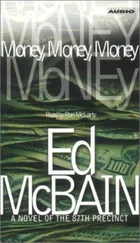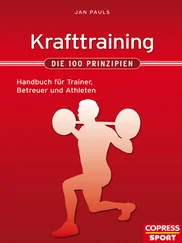He’s awed by the wad: just the naked wad, no wallet nor one of the elegant clasps that he sees many years later in a TV series that reconstructs with insane attention to detail the period when he and his father traveled by taxi to Villa Gesell — the same period, if you can call it that, only in the middle of New York, in the ghetto inhabited by a few pioneers of depredation who, meager as they are, and even conscious of their own irredeemable mediocrity, can already see how far the world will pass into their possession in the years to come. The characters using the clasp are successful forty-somethings dressed exactly like his father, in tweed checked jackets, white shirts always fresh from the laundromat, and ankle boots with buckles on the side, and all of them have his father’s unfailing complicity with their pants’ pockets, which makes it seem less like the pockets were designed for their hands and more the other way around, their hands for these pockets. How many notes must there be? Forty? Fifty? Folded in two, with the largest on the outside and the smallest on the inside, always in strictly decreasing order (and one last slot on the inside, after the smallest notes, reserved for his true monetary weakness: foreign currency, predominantly dollars, Swiss francs, pounds sterling, lire, whichever he’s handled most lately at the travel agency where he works), the wad is so bulky that when he’s holding it his father can’t close his hand, he can’t even put the tips of his fingers together. And it’s heavy, as heavy as a thing, a solid, not just the pile of printed papers it actually is.
So they’ve arrived, and it’s time to pay. Overcome by a rush of fear, he starts to shrink into his corner of the backseat, a paradise of fragrant pleather where he’s just spent almost two happy hours enjoying the pioneer’s brazen sense of superiority (other people swim the English Channel, he unites Mar del Plata and Villa Gesell in a taxi!), but which his terror now transforms into a suffocating hell, a stew of heat and the purring of the motor and the smell of burnt gasoline. He thinks: What if there isn’t enough money? Because his father might have miscalculated. He might simply not have calculated, eager to make up for the disappointment caused by his late arrival and the missed bus. But he soon sees him lean forward, put a forearm on the back of the seat, and take a closer look at the meter, where the now still numbers are offering their final verdict, and his father’s direct approach to the situation calms him somewhat. Everything happens very quickly. The taxi driver leans over, notes the figure on the meter, and starts to look for its monetary equivalent on a plastic tariff sheet. There’s an identical sheet hanging from the back of the seat on their side, but once again his father decides to ignore it: when it comes to reckoning accounts, he trusts his brain’s skill and speed more than the verdict of a printed form, especially one jointly produced by the taxi drivers’ union and the Ministry of Transport, both nerve centers of swindling. And in this particular instance, he also knows full well that there is no tariff to cover something as unscripted as a Mar del Plata — Villa Gesell. It’s a silent, pathetic duel. The taxi driver’s rheumatic finger is still quivering in a wilderness of red and black numbers, hunting a figure it’ll never find, when his father announces the definitive price in a low voice, as though to himself, or for an invisible but very close witness, then selects five or six notes, separates them from the wad, and pays.
Nobody counts money like his father. Counts in the sense of accounting, which when it comes to his father — a man who went to a technical school and graduated with just one skill, a rare talent for what he himself calls numbers, which he flaunts rather immodestly in public, the only thing he permits himself to boast about (being enemy number one of all vainglory) — means purely mental calculations, in which the use of any supplementary instrument is forbidden, including taxi tariff sheets, naturally, but, moreover, machines, calculators, abacuses, manual counters, to say nothing of the electronic bill-counters the size of espresso machines or water dispensers that, years later, are made so trendy by inflation and the foreign-currency black market, machines produced by Galantz and Elwic, MF Pluses by Cirilo Ayling, pride of Argentina — prosthetics that represent the worst, the lowest rank of human spinelessness and dependency — and also pencil and paper and even so-called natural mechanisms like fingers. But also counts in the sense of physical action, as in counting notes. He’s struck by this at a very early age, one day when he spends an afternoon off school accompanying his father on his rounds through the city’s business district, where he works, and sees him cashing checks at banks, buying tickets at airline offices, and trading foreign currency at currency exchanges, and he will never cease to be struck by it, even in the last days at the hospital forty-two years later, just before the lung failure that condemns him to an oxygen mask and tubes, when his father selects two fifty-peso notes from an already significantly depleted wad, having decided to give them as a tip, “before it’s too late,” in his words, to the morning nurse, who surprises him by speaking German to him while changing his IV, giving him an injection, or taking his temperature. Nobody else has his aplomb, his proud, elegant efficiency, which transform the act of paying into one of sovereignty and are enough to make you forget that in truth it’s always a secondary, reactive act. When he counts money, it’s as if he were counting it simply to count it, for love of the art, as they say: because of the beauty of it, never because the logic of the transaction requires it of him. He never slips up, never lets one note stick to another or get stuck or folded, not to mention tear. His fingers are always dry — if he occasionally wets the tips with his tongue, which he says is a habit of bad bank cashiers, dishonest shopkeepers, and misers, it’s always in mockery, just as he mocks the tricks people use to make up for abilities they naturally lack, and he always caricatures the ritual, giving it a bad actor’s pompous gestures — and they move nimbly, without hesitating or pausing; on the very rare occasions on which they stop and start again, either because something else has distracted them or because they’ve been dizzied by their own speed and got lost, they resume the operation just as coolly as before, as though nothing had ever happened, like a musician taking up a score again at the phrase that tripped him up and playing on.
Unlike his rivals in the art of counting — cashiers, people who work at currency exchanges or in the money market, even his own colleagues at the travel agency — whose fingertips are black by the end of the day, tanned like leather by the layer of grime left by the money they’ve been handling all day, his father can count notes for hours without getting his fingers dirty. Even the rubber bands that fasten folded wads of notes — which his father always maneuvers with the fingers of one hand, like a one-armed juggler — lose their propensity for stickiness and dirt in his hands. It’s as though money leaves no mark on him whatsoever. As soon as he thinks that phrase, he feels as though it’s not the first time he’s heard it, and he realizes that if it sounds familiar, that’s because it isn’t his. He has heard it often from his mother’s mouth, though she doesn’t necessarily mean the same thing by it as he does. In fact, it’s this very phrase that she uses a month later, when he returns from his February in Villa Gesell to the apartment on Ortega y Gasset — so tan that when he stands barefoot against the wall for her to measure how many centimeters he’s grown while he was away from her, as she always does and always will, his feet would be lost against the dark wood floor if it weren’t for his toenails, which shine like ten little luminous blots — and, showing off a capacity for memory that’s as merciless as that of an abused woman, which his mother likes to do whenever she recalls the last time she saw him before his father took him away, she abruptly takes up the story of the missed bus and the taxi ride and says how nice, that if they went around spending it like that — paying three hundred for something any father with any sense of responsibility would have gotten for twenty by arriving on time for a meeting arranged months in advance— anyone would be immune to the marks of money. But isn’t that what she herself does years later, when, in one brief, sparkling decade of celebration, ambition, and bad business, she squanders the small fortune that she inherits from her own father?
Читать дальше












